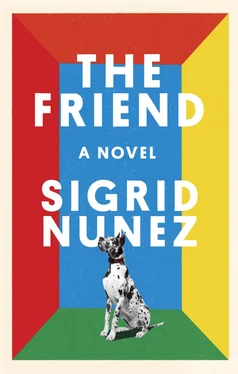Listening to the tapes was often depressing. I remember wondering how the therapist could stand her job, especially after I learned that, in a high number of cases, the couples were not able even with therapy to reconcile their differences and ended up getting divorced. But this was sometimes the point, said the therapist: to help two people let go.
The therapist herself was strikingly glam, slim and tall and a killer dresser (stiletto boots, cinched sweater dresses), who, at forty, had two divorces behind her. As far as I knew, her clients were kept in the dark about her personal life, but I always wondered whether her marital history might have given at least some of them pause. And I remember thinking that, whatever Tolstoy had to say about unhappy families, unhappy couples were all unhappy in the same way.
Just about every husband had been caught cheating or was suspected of cheating. (More than once it was during a session that a man came clean about his infidelities, and it was during a session that one man confessed to his wife that he was in love with another—man.)
In general the women complained of feeling unwanted, underappreciated, and—apparently worst of all—unlistened to.
The men saw their wives as some version of the Grimms’ Fisherman’s Wife: always nagging, never content.
Again and again I was struck by the evidence that, for husband and wife, the same word did not always have the same meaning. The same words would come up all the time, and I would type them: love , sex , marriage , listen , need , help , support , trust , equal , fair , respect , care , share , want , money , work . I would type the words, and I would listen to the couple talk, and I could tell that the same word meant this to him and that to her. I heard several men object to the use of the word adultery to define sleeping with someone outside of the marriage. Adultery is when you make it a habit, insisted one. He doesn’t help me, a wife said. And when her husband reeled off a list of errands he’d done for her only that past week: I said help ! she shrieked. I said help !
One other thing I picked up on, listening to all those sessions: the therapist changed her voice slightly depending on whom she was addressing. Always subtle but always there, a difference in pitch or something, hard to describe. Perhaps all in my head. But if I had to, I’d say she was more on the side of the men.
• • •
I should have known the therapist would want me to stay for the full hour. When I tell him I’ve left Apollo tied up outside, he says, Next time, why don’t you bring him in?
Next time?
That was the deal. The therapist would give me what I wanted, and in return I’d come back.
At least for a couple more sessions, he says.
• • •
Sitting in the therapist’s office, Apollo at my side, I can’t help smiling. It’s like we’re in couples therapy.
Except that we get along.
One time, a woman passing us in the street shot me this: Better a dog for a husband than a husband who’s a dog, I always say.
Always?
When I was in my twenties, out walking Beau, I sometimes got lewd comments from men. That dog your old man? You sleep with that dog? You fuck that dog, lady? I bet you let him eat you.
I find it unsettling when another woman in the street calls Apollo sexy and tells me she’s jealous. You’re a lucky, lucky woman, she says.
• • •
When the certificate arrives, I waft it under Apollo’s nose before sticking it under a magnet on the refrigerator door.
You do realize, says Wife One, that you’re committing fraud. Even if it is for a good cause.
I am aware of the righteous anger of those in genuine need of animal support toward the growing number of people passing off ordinary—and in some cases exotic—pets as service animals. I’ve heard about the skunk in the college dorm, the iguana in the restaurant, the pig on the airplane. I promise that I will not take Apollo anywhere he would not normally be allowed. After making a copy of the certificate to send to the building management agent, I will leave it and the badge from the National Service Animal Registry at home.
As for the therapist, he had no reservations about putting in writing that I was suffering from depression and anxiety aggravated by bereavement, that the dog was providing essential emotional support the loss of which was likely to cause harm to my mental health and might even be life threatening.
Wife One thinks it’s funny: Because the truth is, in this case it’s the animal who can’t deal, and you’re his emotional support human.
• • •
Now I am forced to talk. If nothing else, to explain why I don’t want to talk. Still true: I don’t want to talk about you, or to hear others talk about you.
I want to quote Wittgenstein on the unspeakable and the necessity for silence. Even if quoting philosophers out of context was something you told us not to do. Philosophical statements aren’t old sayings , you said.
A pause here to wonder at Wittgenstein, three of whose four brothers killed themselves, and who often thought about killing himself too. Who, like Kafka, is said to have received the news of his terminal illness with relief, but whose words at the actual hour of death bring to mind George Bailey: Tell them I’ve had a wonderful life!
Do I talk to Apollo, the shrink asks. Well, yes. To encourage bonding, it is recommended that people talk to their dogs. Which seems to come naturally (though my guess is people are now doing it less and less, thanks to our attention-devouring devices).
I once heard a stranger in agitated conversation with her pug: And I suppose it’s all my fault again, isn’t it? At which, I swear, the dog rolled its eyes.
Yes, I talk to Apollo. But not about you. That’s the thing: I don’t have to tell him . ( Dogs are the best mourners in the world, as everyone knows . Joy Williams.)
And just because there are other people who’ve lost someone to suicide doesn’t mean that what I’m feeling is something that can be shared. I did once sit through a radio program on the subject of suicide loss. Listeners were invited to call in and comment. All the usual word-stones were cast: sinful, spiteful, cowardly, vengeful, irresponsible. Sick. No one doubted that the suicide had been in the wrong. A right to commit suicide simply did not exist. Monsters of selfishness and self-pity, suicides were. Such ingratitude for the precious gift of life. And although they might hate themselves, it was not themselves suicides wished to destroy so much as the family and friends they left behind.
None of this was helpful.
But neither were the dozen or so books on suicide that I read this past year. I did learn some interesting things. For example, that certain ancient sages held that voluntary death, though generally to be condemned, could be morally acceptable, even honorable, as an escape from unbearable pain, melancholy, or disgrace—or even just plain old boredom. That later thinkers have suggested that, despite Christianity’s absolute prohibition against committing suicide (though nowhere in the entire Bible is there any explicit condemnation of it), Christ himself could be said to have done just that. That in Western countries the volume of suicide notes reached a peak during the eighteenth century, when they were usually intended to appear, alongside other public announcements, in the newspapers.
And this kicker: Writing in the first person is a known sign of suicide risk.
Читать дальше












